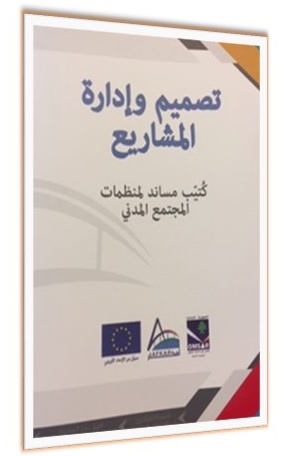The development of human and institutional capacities is a fundamental pillar for the Civil Society Support Program (AFKAR). Working to support the civil society organizations aims to enhance the concepts and practices of Good Governance. The adoption of Governance values and their practical application extend all over the cycle management: the planning, the implementation, the follow-up, the evaluation and the accountability stages, in the various projects and programs.
Reinforcing the capacities of Civil Society Organizations as well as the human resources escorting and incubating their activities in the Public Administration, targets to support the Program’s goals towards strengthening the framework for coordination of partnership between Public Sector and Civil Society Organizations. This partnership will convey the citizens’ needs within their communities and support them through various projects and programs.
The support mechanisms focus on the regular monitoring of ongoing activities within Civil Society projects and their implementation evaluation, as long as they are accompanied by field support. The mechanisms prioritize enhancing and building human capacities, in order to ensure the concept of sustainability after the projects’ completion.
In this context, the Program team’s role has two components: one to one coaching and training workshops.
.png)
Monitoring and Evaluation
AFKAR team relies on subject matter experts to ensure a streamlined and advanced assessment upon project implementation. The team’s responsibility goes beyond monitoring; it also seeks actively to engage with Non-Governmental Organizations stakeholders in the contractual, legal, financial, and technical and media fields. AFKAR team plays an important role in supporting administrative work and human capital management; it also contributes to solving social problems. The team of experts works on due diligence projects with the Public Administration and Municipalities to align with applicable governmental laws, with an assiduous compliance control of the implemented strategies in order to ensure sustainability and success upon project closure.
.png)
AFKAR subject matter experts attended advanced level trainings and acquired certifications to ensure the highest level of Monitoring and Evaluation. At the Office of the Minister of State for Administrative Reform, training sessions for the experts covered a series of technical competencies building – project management, database collection processes, data analysis, evaluation techniques and capitalization, electronic documentation, …
Engaged to reinforce technically the granted CSOs and to help achieving the expected results of the projects, the team of the Program ensured a thorough follow up during the implementation. The monitoring and evaluation tools were developed to be adapted to the needs of the program. In addition to the open contact with the granted CSOs, regular field visits were executed and an active participation to the events and activities were part of the capacity building measures.
Moreover, the team enhanced the capacities of the CSOs to create their internal M&E system, through the review of the projects logical frames and the re-evaluation of the activities impact on the field.
Workshop trainings
Planning and organizing workshop trainings represent a rich experience that was progressing through the implementation of the three phases of AFKAR Program. Based on needs assessments executed through questionnaires, focus groups and monitoring visits, the organized training sessions gave the priority to the human resources of the granted CSOs. The selection of the trainees took into consideration their job and if it was matching with the training contents. More than 25 training workshops were organized to reinforce the knowledge and practices of Good Governance.
The Civil Society Support Program (AFKAR) folder contains a set of training courses that the team was briefed directly on over its three stages. The last of them were ten training workshops on management and communication techniques, and they came under the following headings: financial and legal regulations, writing reports, participatory proposal writing, project management, sub-grants for emerging associations, partnership and networking, time management, monitoring and evaluation, media and communication. |
 |
As for involving government staff in the trainings, it was the added value of AFKAR III. Targeting CSOs and Public Sector employees at the same time seek to achieve the Program’s objectives in strengthening the partnership between the two sectors. The workshops trainings at this level allowed to create a platform of dialogue between the two sectors and to reinforce the process of coordination and partnership.
The abstracts of the training courses have been documented in hard copy version and are available electronically at the following links:
Afkar III
AFKAR III
: Designing and Managing Projects
Afkar II
Afkar I
CSOs trainings
The Civil Society Program (AFKAR) encouraged projects that targeted building capacities of grass roots CSOs, in the aim of reinforcing their capabilities in different fields. Skilled CSOs transferred their knowledge to a large number of small Organizations and guided them to implement small budget Projects through the sub-granting Process.
More than 200 CSOs benefited from the Program. Their staff attended a set of training workshops and learned how to conceptualize, plan and successfully implement projects, as well as monitor and evaluate their impact. Therefore, the Civil Society Program (AFKAR) managed to target a larger number of CSOs and to encourage cooperation and partnerships among them.